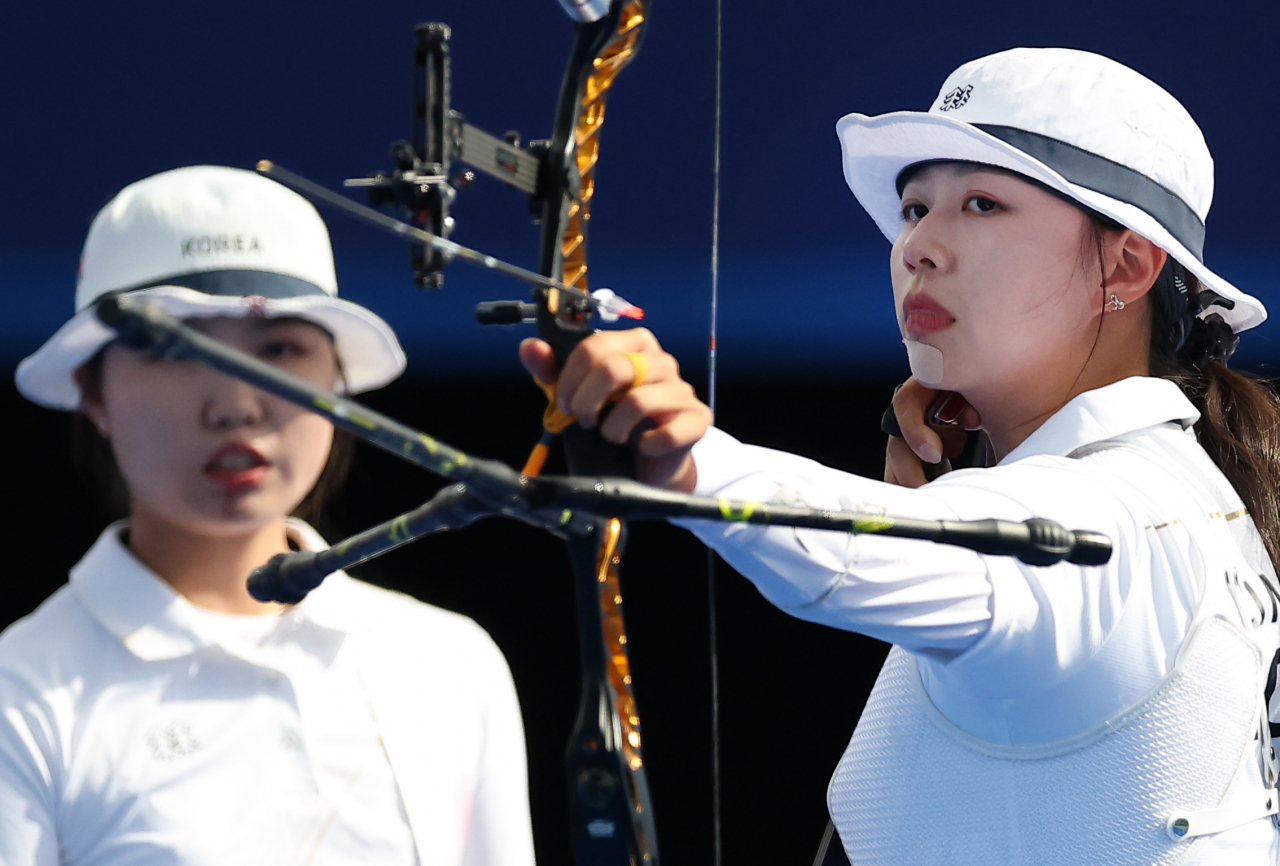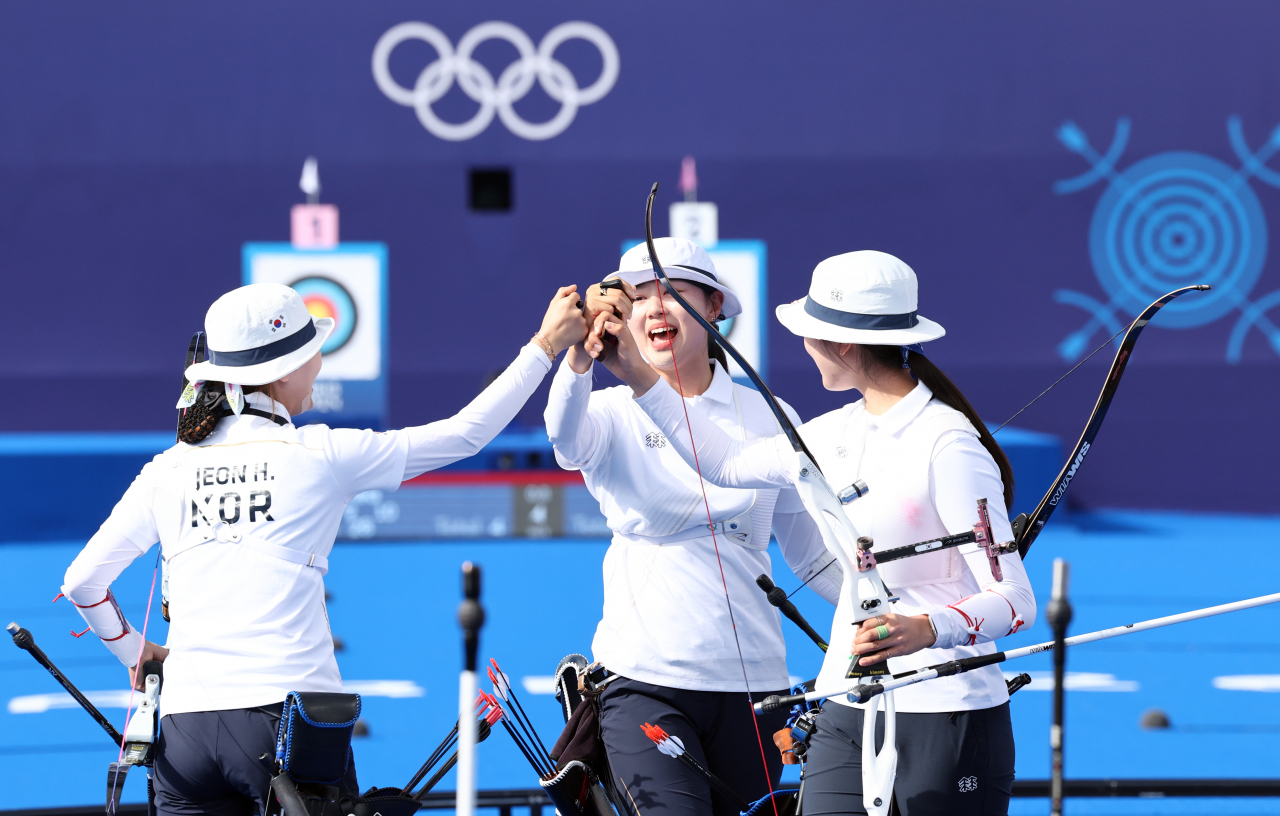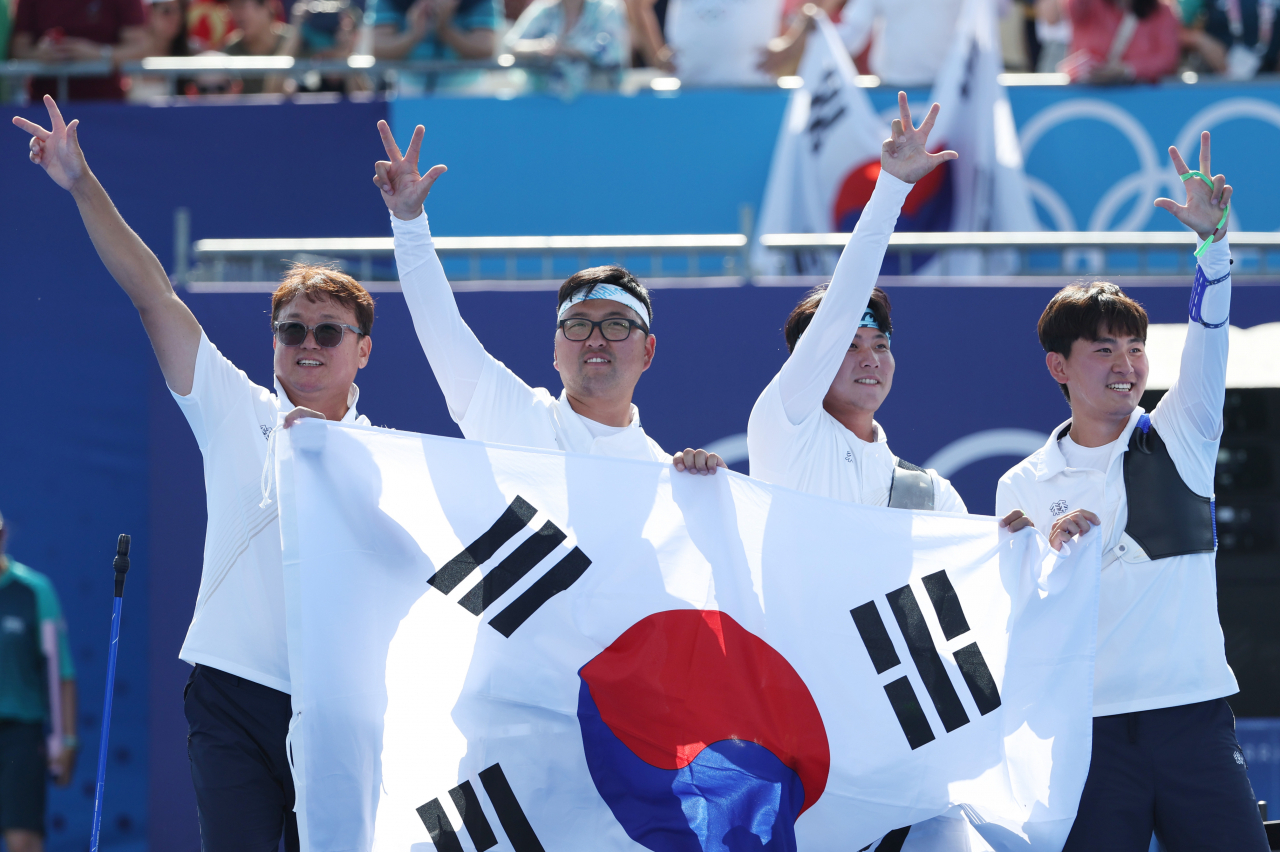(ANN/KOREA HERALD) – On Monday, South Korea celebrated a hat-trick of gold medals in the Olympic men’s team archery event, triumphing over host nation France and achieving a clean sweep of both the women’s and men’s team events at this year’s Paris Olympics.
Archers Kim Woo-jin, Kim Je-deok, and Lee Woo-seok proudly hoisted their national flag after clinching a 5-1 victory in the heart of the French capital.
This victory followed the dominant performance of their female teammates, who secured South Korea’s tenth consecutive gold in the women’s team event on Sunday.
This marks the third Olympics in a row where South Korea has dominated archery’s team events.
South Korea’s consistent success in Olympic archery is reminiscent of other nations’ dominance in specific sports, such as the US men’s national basketball team, famously known as the “Dream Team.”

The nation has participated in individual archery events since 1984 and team events since 1988, and has won a whopping 29 gold, nine silver and seven bronze medals — including the two gold in Paris.
In comparison, the US has won 14 gold medals and Belgium 11, with no other nation winning more than seven gold medals in Olympic archery events.
Throughout the Olympics, the Korean women have won every single women’s team event there ever was — the team event was first introduced in 1988 — and have won all but one individual event since 1984.
Korea’s male archers have been less dominant by comparison with just two gold medals in the individual events, though they have won the team event on seven occasions.
As in case of most sports dynasties, the Korean archery team has its share of stories supposedly behind their consistent level of dominance.
They range from bar joke-level myths to analysis of their training and selection system, in which the athletes go through an intense level of training surpassing even the Olympic level.
Beating the best to become the best
“Our country has so many great athletes (in archery), and only the very best of them get to go to the Olympics.
Since they are picked from the best, (the Olympic athletes) play the sense of responsibility of having to represent the other players. I think this is how we are able to garner such great results,” said Ki Bo-bae, a now-retired archer who won three Olympic gold medals.
Many Korean archers cite the extremely high level of competition that the archers go through in order to get to the Olympics.

“Only a razor-thin difference separates most (archery) athletes in South Korea, who go through a fair selection process. We go through a multilevel selection process domestically and beat great competition to become national team members and compete at the Olympics.
I think that’s why Korea is so good,” Kang Chae-young, a member of the Korean women’s team for the Tokyo Olympics, said after the country won its ninth gold medal in the women’s team event.
After losing in the quarterfinals of the individual event, Kang had pledged to win the event in Paris. But she failed to make the cut for the Paris Olympics.
Korea does not grant advantages of any kind to players based on their past accomplishments, meaning that even previous Olympic gold medalists have to compete from scratch for their spot in the next Summer Games.
This forces athletes to hone their skills continually and be at the absolute top of their game.
Training for perfection
In order to perfect their skills, Korea’s archers go through intense training process from young age. Contrary to some misperceptions, Korea does not provide archery courses in its official education courses: most Koreans go through their entire lives without ever touching a bow or arrow, just like in many other countries.
Over a decade ago, Reuters reported about the “kimchi fingers” theory, in which Korean archers’ dexterity was supposedly due to the repeated use of chopsticks — a myth that can obviously be debunked by the facts that chopstick use is common outside of Korea, and none of the other historically chopstick-using countries or people come close to duplicating Korea’s dominance in the sport.
For example, China has won only one Olympic gold medal ever, while Japan has never won any.
Another myth-slash-joke attributes Koreans’ archery success to the ancient Korean kingdom of Goguryeo, the first king of which was a master of archery.
Of course the kingdom ceased to exist in 668 AD, and most other countries throughout the world have used bows and arrows as primary weapons before guns were invented.

Most experts attribute the success of Korea’s archers to their biomechanical approach to perfect archery techniques, dedicating several months to learning the proper stance and how to raise their arms.
The dedication to the fundamentals, coupled with years of devotion and extreme competition combine to yield the most accurate marksmanship in contemporary times.
Brady Ellison, an American archer who won three Olympic medals, told an agency in a past interview that Korean archery students “have six months intensive training before they shoot their first arrow.”
The Korea Archery Association in 2013 announced a long-term plan to develop the future of Korean archery, which includes the selection and support of youth athletes showing potential. In the same year, the association selected 10 archers aged 15 and under to receive equipment and training that had been previously reserved for national team-level athletes.
The KAA has long been touted as a model athletic association in the country, financially backed by sponsor Hyundai Motor Group, which has provided substantial funding for the archery teams.
Korean archery has a longstanding reputation for preventing the formation of the factions, which have ailed several other major sports.
Whatever the reason may be, the country has been more successful than any other nation in the sport since the 1980s, and is set to add to its already huge pile of medals this week.
With Korea already having reached its preliminary goal of five gold medals, the archery team members are now shooting for a clean sweep across the women’s and men’s individual and team events. Despite Korea’s relative dominance, it achieved a clean sweep in archery on only one occasion back in 2016.
The women’s and men’s finals are set for Saturday and Sunday, respectively. The finals for the mixed team event, in which Korea won the inaugural gold medal back in the Tokyo Olympics, will take place on Friday.







